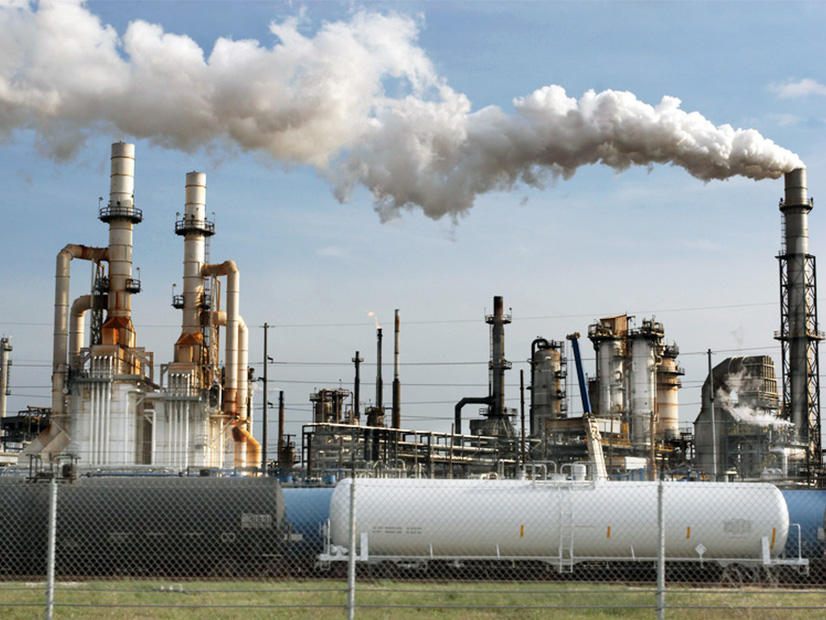
Bolstered by a nearly $5 million war chest, supporters of Washington’s cap-and-invest system have begun efforts to defeat a campaign that seeks to scrap the carbon allowance program through a referendum this fall.
Conservative group Let’s Go Washington placed Initiative 2117 on the November ballot to call on voters to repeal the program, which the state’s Department of Ecology implemented last year as part of the Climate Commitment Act. The effort comes as Washington moves to link the program with the larger and well-established cap-and-trade program shared by California and Quebec. (See Calif., Quebec, Wash. to Explore Linking Carbon Markets.)
Cap-and-invest supporters in February formed the No 2117 coalition, which has collected about $4.7 million and spent around $365,000, according to the Washington Public Disclosure Commission (PDC).
Big donors include Microsoft founder Bill Gates and software developer Chris Stolte, who each contributed $1 million, as well as husband-and-wife software developers Craig McKibben and Sarah Merner, who together gave $1 million.
In a press release April 17, the coalition said pending donations would increase the total to about $11 million, with pledges from Amazon, Microsoft and former Microsoft CEO Steve Ballmer and his wife, Connie Ballmer.
“We’re going to make sure we have the resources needed to defeat 2117,” No 2117 spokesman Mark Prentice told NetZero Insider.
The membership of No 2117 is dominated by environmental and liberal political organizations, but also includes the Seattle Metropolitan Chamber of Commerce, BP America and the Certified Electrical Workers of Washington union.
During its signature-gathering phase last year, Let’s Go Washington raised $7.37 million and spent $7.66 million, according to the PDC. The group has raised $765,488 and has spent $464,970 so far this year, and has $256,873 in debts.
Redmond hedge fund manager Brian Heywood provided roughly $5 million of the group’s 2023 donations to get I-2117 on November’s ballot.
“I’m not putting any more money into it,” Heywood told NetZero Insider. That $5 million also contributed to placing two other Let’s Go Washington initiatives on the November ballots: one that would repeal the state’s fledging capital gains tax and another that would allow residents to opt out of a tax that funds a state program to provide for long-term health care.
Cap-and-invest supporters “are going to have to raise $15 million to convince people of something that is not true. [The program] is not designed to remove climate change; it is designed to be a tax,” Heywood said.
Both sides said they expect many small contributors to donate to their campaigns.
“Other side is a bunch of big money. … They’re going to make me the villain. … This is the American Revolution army versus the well-financed British army,” Heywood said.
‘Catastrophic Blow’
Meanwhile, the Western States Petroleum Association (WSPA) — which represents four of Washington’s oil refineries, as well as others along the West Coast — plans to sit out the balloting.
“We do not oppose the [Climate Commitment Act] and believe the cap-and-trade program should be fixed rather than repealed. We are not involved in the campaign,” WSPA spokesman Kevin Slagle said in an email.
Washington’s fifth oil refinery is owned by No 2117 coalition member BP America.
Let’s Go Washington’s repeal campaign plans revolve around the rise in Washington’s gasoline prices, while No 2117’s efforts will stress the fallout for Washingtonians if the cap-and-invest program is revoked.
“We’re going to talk about the costs of what [cap-and-invest opponents] are imposing,” Prentice said.
“I-2117 would deal a catastrophic blow to efforts to reduce carbon and health-harming air pollution, and it would have a devastating impact on our state budget,” David Mendoza, director public advocacy and engagement at The Nature Conservancy in Washington, said in No 2117’s April 18 news release. “I-2117 would take away billions of dollars for needed investments in renewable energy, clean air and water, healthy communities, healthy forests and economic support for those most impacted by the climate crisis. That’s why a broad coalition of organizations and community leaders from across our state has come together to mobilize communities in Washington to defeat I-2117.”
Since being implemented last year, Washington’s cap-and-invest program has raised almost $2.1 billion. The state’s Legislature recently appropriated $816 million in cap-and-invest money to support programs during the fiscal year running from July 1, 2024, to June 30, 2025.
That spending is split between the Legislature’s transportation and capital budgets.
The transportation portion includes building hybrid electric-diesel ferries, buying electric school and transit buses, installing charging stations, bolstering Washington’s fledgling hydrogen industry, purchasing electric vehicles for several state and local agencies, and designing a hydrofoil for the Kitsap Transit system, plus several road, bridge and small boat projects.
The capital budget portion includes grants or direct appropriations for energy conservation at the state’s universities, forest land purchases, restoring landscapes destroyed by wildfires, restoring coastlines, salmon recovery, sewage treatment and EV chargers. It also covers energy conservation measures at juvenile detention facilities, decarbonization projects, energy conservation in other buildings, and modernizing conservation measures in small school districts and tribal schools.


